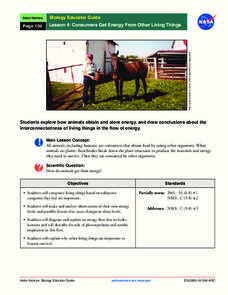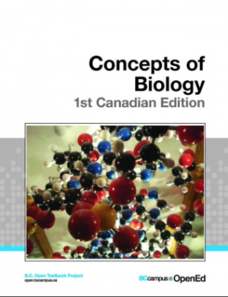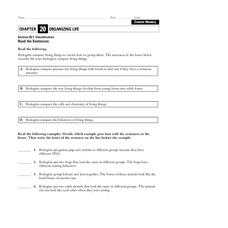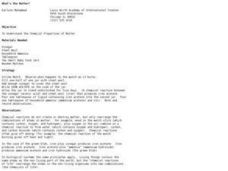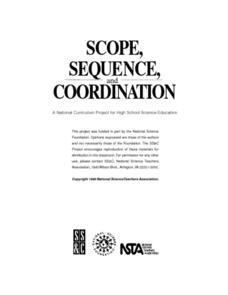Pace University
Grade 6-8 Living Things
What characterizes a living thing? Scholars explore the concept during a differentiated instruction unit on living things. They perform lab experiments to determine how animals adapt to stimuli, watch videos and learn about...
Curated OER
Basic Needs of Living Things - Lesson Two
Fourth graders study and identify the basic needs of a variety of organisms. Terrariums and aquariums are used to demonstrate what plants, animals, and fish need to stay alive. These two classic models are used to effectively convey what...
Biology Junction
Elements and Macromolecules in Living Things
In this biology learning exercise, students read about macromolecules and elements in living things to answer 56 questions that follow. They also draw the molecular structure of some organic and inorganic molecules.
Casimir Middle School
Biological Classification Worksheet
Classify living things with a set of worksheets that has pupils sorting and indentifying living and non-living things. Learners use the worksheets as a basis for finding their answers.
Curated OER
Basic Needs of Living Things - Lesson One
An interesting way of teaching about basic needs of different organisms awaits your fourth graders. Pupils take part in class discussions and demonstrations which should lead to a greater understanding of how to determine basic needs. As...
NASA
Consumers Get Energy From Other Living Things
How do plants and animals get their food? Learn about where energy comes from, how animals store energy, and aerobic respiration, in a instructional activity that allows scholars to diagram energy flows.
Curated OER
The World of Living Things
The World of Living Things is the focus of this biology presentation. Students view a presentation which introduces them to cells, parts of cells, microorganisms, and simple vs. complex animals. They see that they are classified as a...
NASA
Decomposers Get Energy From Dead Things
When life gives you mold, make penicillin. Scholars design an inquiry experiment to determine what causes rotting and mold growth. It also covers decomposers and the important role they play for other living things.
Curated OER
Characteristics of Living Things
Students discuss the criteria for living things with their groups. They come to a consensus on at least five or more characteristics of a living thing. They determine if the lab samples are living, non-living, or other.
Curated OER
Basic Needs of Living Things-Lesson One
Fourth graders explore the basic needs of living things. They observe a variety of living things and identify the basic needs of each living item. Students create food balls of peanut butter and nuts to feed animals. They hang their food...
Serendip
Is Yeast Alive?
Through two investigations, life science learners determine whether or not yeast is alive. They perform tests for metabolism by providing sugar and observing if gas is produced as a byproduct. They incubate some of the sample for at...
New South Wales Department of Education
Is it Alive?
Interestingly enough, movement is not a characteristic of living things. The first activity in a series of 20 introduces learners to the concepts of living versus non-living things and then focuses on biologists and what they study....
It's About Time
Diversity in Living Things
How diverse is the world we live in compared to the way things used to be? Young biologists explore diverse organisms and relate the structure of each organism to its ability to survive in our current environmental conditions....
Curated OER
Classification of Living Things
Biology learners will be able to explain the binomial nomenclature system and name the seven levels of classification of living things after viewing this set of slides. Brightly colored with bold fonts, the format is eye-catching, and...
BC Open Textbooks
Concepts of Biology – 1st Canadian Edition
How diverse are living things? Individuals explore topics such as cells as the foundation for life, cell division and genetics, molecular biology, and animal reproduction using an open resource Biology textbook. They learn key terms...
Biology Junction
Introduction to Biology Crossword
In this introduction to biology, students complete a crossword puzzle with 22 questions. They identify common terminologies used in the study of biology.
Curated OER
Living vs. Non-Living Things
Fourth graders describe the characteristics that determine if something is living, dead, or non-living. They determine the difference between living and non-living things. Students determine if an object is living or non-living and...
Curated OER
Classification
In this classification worksheet, students use information describing the ways biologists compare living things to complete 4 matching questions.
Curated OER
What's the Matter? (Living and Non-Living Things)
Understand how chemical reactions recombine atoms to create the "chemicals of life". An experiment, showing the basic chemical reactions of an iron nail or a match, helps young children start their understanding of permanent changes.
Curated OER
What is a Living Thing, and How Does a Living Thing Respond to Its Environment?
Students investigate how living things interact with their environment. In this living things lesson, students complete lessons for science investigations on what living things have in common. Students study cells, complete...
Curated OER
Draw an Alien in Natural Habitat
Students apply prior knowledge of living things, structures of living things and how living things sense and respond to their environment. In this habitat lesson, students review the basic needs of organisms to survive. Students create...
Curated OER
It's Alive!! Or, Is It?
In this cell worksheet, students complete 5 word scrambles and 8 true-false questions about the characteristics of living organisms and compounds found within cells.
Curated OER
Bats About Stellaluna
Students, after listening to Janelle Cannon's picture book Stellaluna, explore a variety of living things through three distinct activities. They make a list of what they know and want to know about birds and bats. Orally and in writing...
Curated OER
Variations in Living Things
Biology beginners observe traits in a collection of plant parts to realize the tremendous amount of genetic variation within a species. They consider rules of nature and discuss what would happen if they changed. They also examine data...







